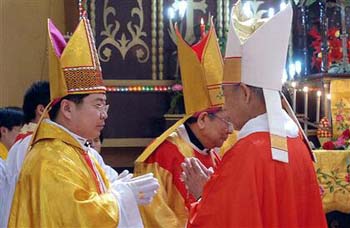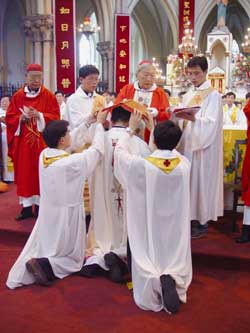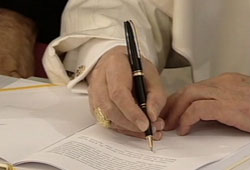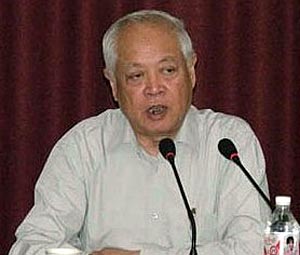 |
Traditionalist Issues
Aftermath of the Papal Letter to Chinese Catholics – Part II
China Hardens Position against the
Underground Church
Margaret Galitzin
In Part I of this article on the aftermath of Pope Benedict XVI’s Letter to the Chinese Catholics, it was shown that there are more questions than answers at this point. Let me offer, however, a synopsis of some reactions to the Vatican initiative taken from recent news reports.
New bishop named
As expected, there were no official reactions from the Communist regime for several weeks after the release of Benedict XVI’s letter, just a terse message from the Chinese Foreign Ministry repeating the two pre-conditions: no interference in China’s internal affairs and cut diplomatic relations with Taiwan. By the way, this was judged by the Vatican to be a “positive reality” (1).

CPA Liu Xinkong, left, is installed bishop in 2006 without the Vatican's approval |
An unofficial response, however, was given. The papal letter was released to the press on June 30, having been sent some days before to the Chinese Communist government “as a sign of courtesy.” On July 5, a Hong Kong Communist paper reported that four bishops would be installed without and against the approval of Rome (2). Then, on July 16, the state-controlled Catholic Patriotic Association (CPA) announced it had elected yet another bishop, this time for the important Beijing position. Candidate Joseph Li Shan was installed shortly afterward by the CPA without Vatican approval (3).
What was the Vatican's response to this challenge? Taking the conciliatory position, Secretary of State Cardinal Bertone described the new bishop-elect as a “very good and suitable person,” and expressed hopes he would ask the approval of the Holy See (4). He has not done so yet. That is, the Vatican received the slap in the face with a shameless and benign smile.
Liu Bainian, the head of the CPA, sent the same old message: “China will continue to ‘self-elect and self-ordain’ bishops … Nobody can stop us” (5). Any “dialogue” that opens must begin with that premise.
Is such a dialogue possible? Apparently so. It should be noted that Pope Benedict did not explicitly insist on the right to appoint Bishops in his letter. Rather, he took a conciliatory approach by saying merely that the Holy See “would desire to be completely free to appoint bishops” (n. 9). What these indefinite words mean, only the future will say for sure. But with the data at hand, we can conjecture that the Vatican plans to accept without complaint the bishops imposed by the Communist-directed CPA.
China hardens position against Underground Church

The CPA announced it will continue to elect bishops without Vatican approval |
There was another unspoken reaction to the Pope’s “grand overture.” A new series of arrests of underground Catholic priests by the Communist police indicates a hardening of the government’s position. Also, the usual summer youth catechesis and meetings were halted.
In the week after the Letter was published, police arrested four more underground priests, three in Mongolia, and another, 50-year-old Fr. Liu Tai, in Zhoulo county. They were locked in an iron cage, and have been transferred to an undisclosed location. The promise of early release of another priest-prisoner, Wenzhou Diocesan chancellor Fr. Jiang Sunian, was revoked. Visits to the priest-prisoners, who receive needed food and clothing from relatives, have also been forbidden (6). Local AsiaNews sources affirm that this series of arrests is “a government answer to the Pope’s Letter” (7).
The papal letter’s silence about the present-day persecution – the suffering was mentioned as something from the past that needs to be forgiven and forgotten – has not gone unnoticed by all. UCANews reported a reaction of an underground priest’s first impression on the papal letter. The priest, in his 30’s, asked to remain incognito for fear of government reprisal.
He expressed his thanks for the letter, and support for the call for unity and reconciliation. But he stressed that unity should not be made unless Catholics receive religious freedom, and noted that no one can ignore China still has a long way to go in this regard. He ended with this strong criticism:
“[The letter] mentions not a single word about Bishops and priests still in prison, not a word of support for these still suffering brothers.
“The fact that the Pope, as pastor of the Universal Church, does not even mention those still suffering in his letter is frustrating and shocking.
"We are not telling the people to offend the Chinese government by mentioning it, nor requesting any special rights. We only want assurance that the Universal Church has not totally abandoned these people who are suffering, in silence. This is just a humble request” (8).

No mention of the persecution in the letter |
I think this must be the tip of the iceberg of disagreement and confusion Benedict XVI’s letter is raising among those who read it. So far, however, even permission to read the Pope’s letter has not been easy. The letter was uploaded to Catholic websites in China but disappeared shortly after. Access to the Vatican website was also blocked. Recently, the Hong Kong CPA diocese issued its own translation, because, it alleged, the Vatican’s translation “contains mistakes and is hard to understand.” This new translation, which alters any slight criticisms of the Communist regime to favorable comments, only adds to the confusion (9). So far, there has been no comment from the Vatican on this fraud.
An invitation issued and revoked
Vice-Chairman of the CPA Liu Bainian, called the “Black Pope” because of his overweening power, oversees the confirming of bishops, controls church affairs, instigates persecutions. Needless to say, he’s not trusted or liked by the Underground Catholic Church or even by many in the CPA. So, it was a surprise when he declared that he hoped to see the Pope visit and celebrate Mass in Beijing during an interview published on July 24 in the Italian daily La Repubblica (10).

Liu Bainian extends, then revokes, an invitation for the Pope to say Mass in Beijing |
The next day, however, he denied the “invitation,” insisting again that hopes are impossible until diplomatic ties are normalized, which means that the Vatican cut ties with Taiwan and stay out of Chinese religious affairs (11).
The only favorable comment of Liu Bainian about the papal letter was his remark that it was “different from other papal letters” because it was not opposed to Communism and the socialist system and showed that “the Pope wants to better understand China’s Church.” But Bainian was also quick to warn that China's official church was "incompatible with Catholic doctrine" (12). He is certainly right on that point. It seems that Pope Benedict XVI does not understand irreconcilable contradiction as clearly as the Communist leader...
What should we conclude about the spectacular request made by Benedict XVI that the underground Catholics give up their fight for the Faith, unite with the CPA and support the Communist regime?
Even if the Letter had produced the religious liberty the Vatican dreams of, it would be condemnable, since the end does not justify the means. But it did not produce it.
What happened is that the Pope sold out Catholic honor, but this did not stop the persecution.
We should continue to pray for our heroic underground Chinese brothers in the Faith.
Continued
Footnotes:
1. Sandro Magister, “The Pope Writes, but the Beijing Authorities don’t respond,” www. Chiesa.com, August 4, 2007
2. Ibid.
3. “The new Bishop of Beijing is elected,” AsiaNews.com, July 18, 2007
4. Ibid.
5. “Church will continue to ‘self-ordain’ bishops,’” UCANews.com, July 5, 2007
6. “Four underground Preits are arrested,” http://www.cardinalkungfoundation.org/press/070728.htm
7. “China hardens position against underground Church,” August 2, 2007 http://www.cardinalkungfoundation.org/press/070728.htm
8. “Underground Priest’s First Impression on the Papal Letter,” July 6, 2007
9. “Hong Kong Diocese Issues Revised Chinese Version Of Papal Letter,” UCANews.com, August 3, 2007
10. “Chinese official invites Pope Benedict to visit China,” CAN online, July 24, 2007
11. “Liu Bainian goes back on his invitation to Pope,” AsiaNews online, July 26, 2007
12. “Chinese Official Catholic Church Welcome’s Pope’s letter,” The Anatolian Times, July 2, 2007

Posted August 15, 2007

Related Topics of Interest
 A Shameful Silence A Shameful Silence
 Quo Primum vs. Motu Proprio Quo Primum vs. Motu Proprio
 Benedict Delivers Chinese Underground Catholics to Communism Benedict Delivers Chinese Underground Catholics to Communism
 Has the Pope Forgotten What Communism Is? Has the Pope Forgotten What Communism Is?
 Reactions to Benedict’s Letter to China Reactions to Benedict’s Letter to China
 The Motu Proprio, After the Emotions The Motu Proprio, After the Emotions
 Cheese in Mousetrap Cheese in Mousetrap

Related Works of Interest
|
Traditionalism | Hot Topics | Home | Books | CDs | Search | Contact Us | Donate

© 2002- Tradition in Action, Inc. All Rights
Reserved
|
 |
|